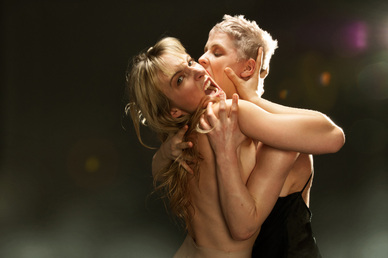 Duels, photo by Damian Siqueiros Duels, photo by Damian Siqueiros Fight your partner to the death. If you win, they can always be replaced anyway. It’s a feeling that can come from living in a city with an endless supply of single people, or from witnessing a dance show with an unusually high number of performers: twenty-one of them in the case of Cas Public’s Duels, which includes the entire company, plus a few choice guests. Helen Blackburn and Pierre Lecours share choreographing duties for the twenty short pieces that make up the programme. Despite the possibilities that such a high number of performers and pieces offer, the numbers are often repetitive. The opening prologue sets us up for what can be expected for most of the night: a man and a woman, the latter fragile, on pointes, needing the help of the man to support her. When she loses the duel, another man picks her up from the floor, less from compassion than opportunism. It’s not the first time that Cas Public flirts with gendered violence. It was also at the core of Suites Cruelles, their last show not aimed at children. There seems to be a tension between wanting to deal with the world as it is, recognizing that sexism still exists, and wanting to transcend these confines. Unfortunately, the latter happens too rarely, though it does offer Duels its most invigorating moments. In the second duet, Blackburn herself dances with Sébastien Cossette-Masse, a younger male dancer, and it begins and ends with her lifting him and carrying him a few steps across the floor. Beyond the pleasure of seeing Blackburn, who usually sticks to the role of choreographer, onstage, there is also the satisfaction of witnessing this reversal of typical ideas surrounding age and gender. There is but one duet that involves two women (Geneviève Bolla and Daphnée Laurendeau) and one that involves two men (Lecours and Simon-Xavier Lefebvre). For better of for worse, they don’t look much different from the rest. The most subversive moments occur in straight couplings, like when Daniel Soulières and Merryn Kritzinger both lift each other off the floor independently of their gender or age difference. Or in the duet with relative newcomers, choreographer Virginie Brunelle and dancer Alexandre Carlos, where the overall violence of the show finally lets up to give us something refreshingly gentler, with little physical contact. However, the duel ends with Brunelle being carried off by another man with her legs wide open as her partner goes on to dance with another woman. Like what women can always be replaced. A couple of men do figuratively put themselves in women’s shoes as they pull off a few ballerina steps. Soulières, lifted by three other men, dances above the ground as if he were lighter than a feather. Cai Glover, in his duet with Laurendeau, has a few brief moments on the tip of his toes, as though on pointes. After all the ass slapping that women in the show have to endure, each time with the sting of female objectification, it is also a mild compensation when actress Sylvie Moreau gives the same treatment to Carlos. For the most part, Duels bathes in the themes that might be expected given the title of the show: couples, fighting, mirror images, and – though dance critics see sex whenever two dancers happen to touch one another – indeed, sex. As the motionless bodies pile up onstage, it becomes clear that, as Pat Benatar’s catchy anthem goes, love is a battlefield. Duels 12-14 & 19-21 September at 8pm / 22 September at 4pm Agora de la danse www.agoradanse.com 514.525.1500 Tickets: 32$ / Students: 24$
0 Comments
|
Sylvain Verstricht
has an MA in Film Studies and works in contemporary dance. His fiction has appeared in Headlight Anthology, Cactus Heart, and Birkensnake. s.verstricht [at] gmail [dot] com Categories
All
|
 RSS Feed
RSS Feed